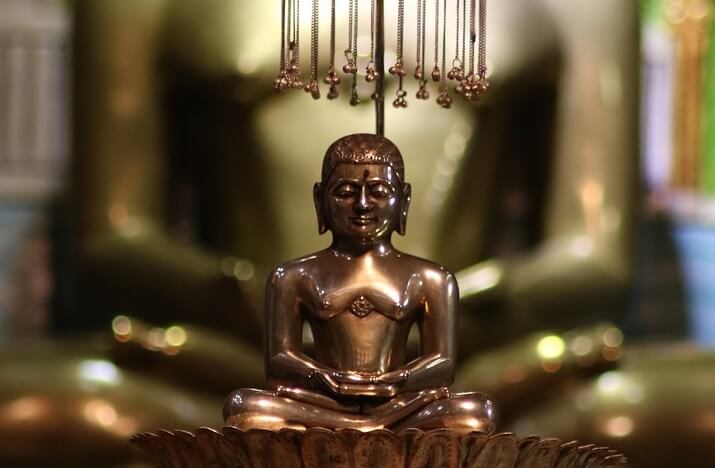The Enlightened Path: Life and Teachings of Mahavira

Early Life and Renunciation
Mahavira, born as Vardhamana, was the 24th and last Tirthankara of Jainism. He was born into a royal family in present-day Bihar, India, around 599 BCE. From a young age, Vardhamana showed a deep inclination towards spirituality and detachment from worldly pleasures.
At the age of 30, Mahavira renounced his princely life, leaving behind his family and royal comforts. He embarked on a spiritual journey, seeking enlightenment through intense meditation and severe austerities.
The Path to Enlightenment
For 12 years, Mahavira practiced extreme forms of self-discipline and meditation. He endured physical hardships and mental challenges, remaining steadfast in his pursuit of ultimate knowledge. His unwavering dedication led him to attain Kevala Jnana (omniscience) at the age of 42.
Core Teachings of Mahavira
- Ahimsa (Non-violence):
Mahavira emphasized ahimsa as the supreme principle. He taught that all living beings, from the tiniest insect to humans, have souls and deserve respect and protection. - Anekantavada (Many-sided Reality):
This principle advocates for the multiplicity of viewpoints. Mahavira taught that reality is complex and can be perceived differently from various perspectives. - Aparigraha (Non-attachment):
Mahavira encouraged his followers to minimize possessions and attachments, as they are the root cause of suffering and bondage. - Satya (Truthfulness):
He stressed the importance of speaking and living truthfully, as it purifies the soul and leads to spiritual progress. - Asteya (Non-stealing):
Mahavira taught that taking anything not willingly given is a form of theft and should be avoided.
The Five Great Vows (Mahavratas)
Mahavira established five great vows for ascetics, which later became the cornerstone of Jain ethics:
- Ahimsa (Non-violence)
- Satya (Truthfulness)
- Asteya (Non-stealing)
- Brahmacharya (Celibacy)
- Aparigraha (Non-possession)
These vows, when practiced with utmost sincerity, lead to the purification of the soul and ultimately to liberation.
Spreading the Dharma
After attaining enlightenment, Mahavira spent the next 30 years traveling across India, teaching and spreading his spiritual insights. He attracted followers from all walks of life, including royalty, merchants, and common people.
Mahavira’s teachings were initially passed down orally through his disciples. Later, they were compiled into sacred texts known as Agamas, forming the foundation of Jain philosophy and practice.
Legacy and Impact
Mahavira’s teachings have had a profound impact on Indian philosophy and spirituality. His emphasis on non-violence influenced many later Indian thinkers, including Mahatma Gandhi. The principle of Anekantavada has contributed to the development of pluralistic and tolerant thought in Indian philosophy.
Today, millions of Jains worldwide continue to follow Mahavira’s teachings, striving to live a life of compassion, non-violence, and spiritual purity.
Conclusion
Mahavira’s life and teachings offer a path of spiritual evolution through self-discipline, compassion, and wisdom. His emphasis on non-violence and respect for all life forms remains highly relevant in our modern world, facing environmental and ethical challenges. By embracing Mahavira’s principles, we can cultivate inner peace and contribute to a more harmonious world.
As we reflect on Mahavira’s teachings, let us remember that the journey to enlightenment begins with small steps of mindfulness and compassion in our daily lives.



